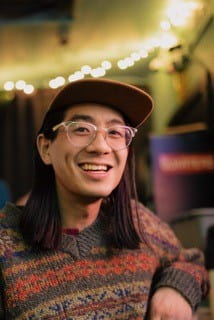 Mitchell Yep is a UO alumni who majored in International Studies and got a minor in Global Health. Mitchell answered a few questions about their current pursuits and some of the lessons they took away from the Global Health program.
Mitchell Yep is a UO alumni who majored in International Studies and got a minor in Global Health. Mitchell answered a few questions about their current pursuits and some of the lessons they took away from the Global Health program.
What are you up to these days? Why and how did you decide to pursue what you’re currently doing?
Currently, I work as a Clinical Research Coordinator for OHSU Early Detection and Advanced Research Center. On a daily basis, I am collaborating with industry sponsors to coordinate study start-up, enrollment, management, and follow-up. This may look like drafting consent forms, calling eligible participants, and conducting brief medical history reviews with patients. All of our research studies are investigating blood tests that can be used to detect cancer. Although many of these tests are in the early stages, I’m excited to share that one of them is pending FDA approval and may become a common screening test for people at a higher risk for cancer. You can read more about the Pathfinder 2 study here:
https://www.ohsu.edu/knight-cancer-institute/join-pathfinder-2-study-find-cancer-early
I am actively a part of this study’s daily operation and recruitment.
I decided to work as a clinical research coordinator because I have always been interested in post-graduate research. While at UO, I tried my best to get involved with faculty research as a research assistant. My undergraduate research experience planted the seed for my future, encouraging me to get involved with current public health research.
In the Fall I will be attending Johns Hopkins for a Masters of Science in Epidemiology. I am excited to attend the Bloomberg School of Public Health and aspire to work for the CDC as an environmental epidemiologist.
What was your biggest takeaway from the GH minor at UO?
My biggest takeaway from the GH minor is that there are many aspects of Global Health. When working to improve health outcomes, you must be willing to collaborate with others – specifically the people you are trying to help.
How can you apply the topics you’ve learned about in GH classes to work outside the classroom?
On a daily basis, our team is working to promote diversity within research and recruit non-white Oregon residents in Clinical Trials. Building this partnership is difficult because our research team did not have any preexisting connections or relationships. We had to network with different hospitals and clinics located in more racially diverse areas. After the logistics have been developed, our team has been focusing on recruitment methods and strategies. I think about my experience in GH classes when reflecting upon our recruitment strategies. We have worked with several community members and constantly use the feedback from our participants to better develop and create our recruitment strategies.
Within our own communities here in Oregon, there is diversity and generally a lack of understanding between each other if done without thinking. There is always a chance to be critical and reflective about the messages you share and the ones you receive.
How has the pandemic affected your feelings about working in heath promotion and disease prevention?
The pandemic has highlighted income and class disparities within our own communities. It has motivated me to further focus on a career in public health. I am interested in studying how our built environment can impact our mental, physical, and social health.


